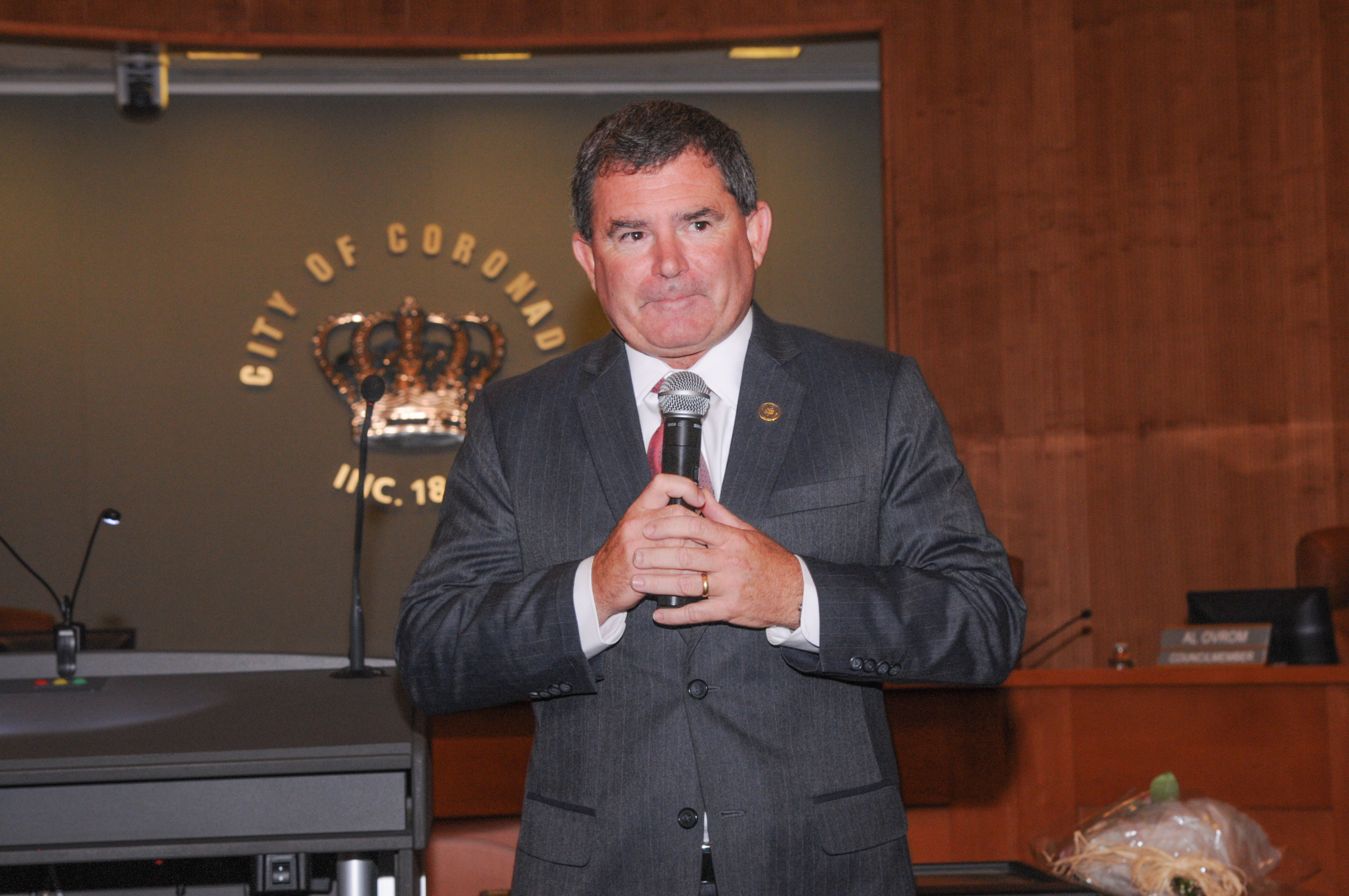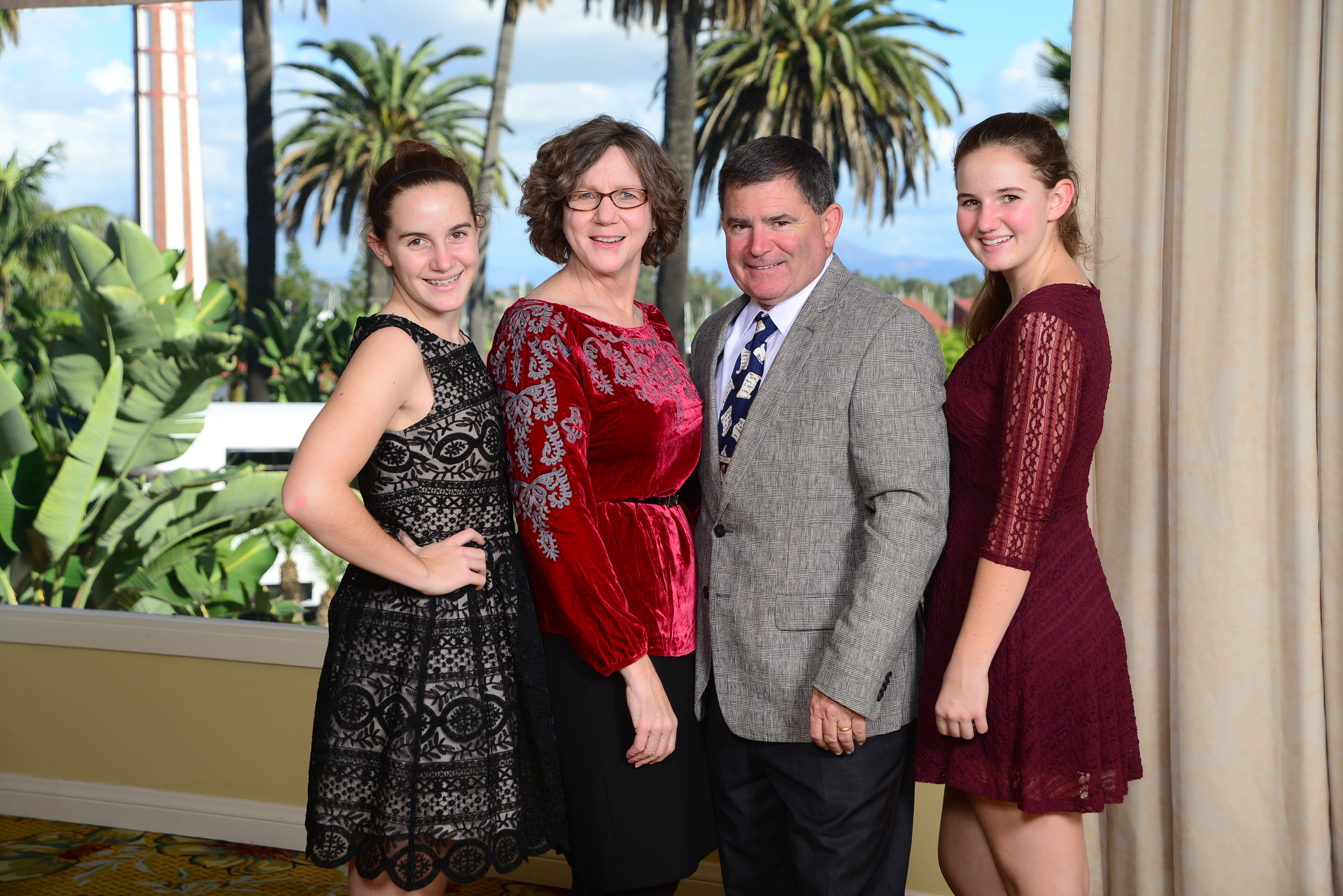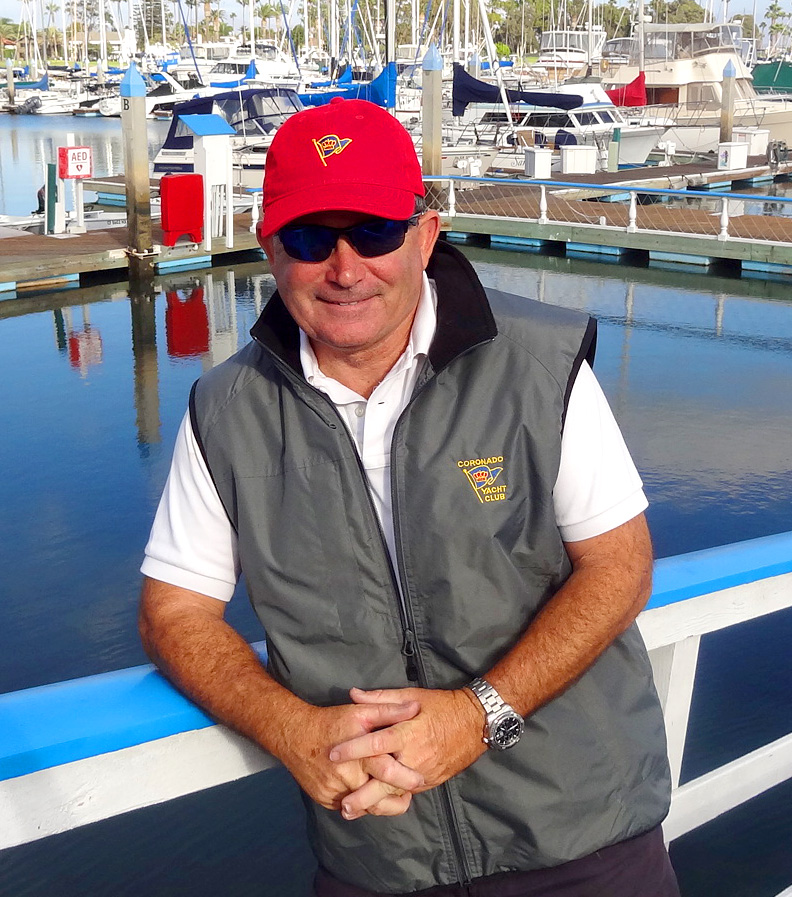 Interviewing City Council member Bill Sandke at a busy Panera on a rare, rainy Friday morning, we both reflected on how fortunate we are to call Coronado home. Both of us Coronado High School graduates, I asked Bill about his experiences as a child here in Coronado. He explained that, like many in Coronado, he moved here because his dad was in the Navy. Bill went to Crown School during his elementary school years, and he shared that he made real friendships there that he still values today.
Interviewing City Council member Bill Sandke at a busy Panera on a rare, rainy Friday morning, we both reflected on how fortunate we are to call Coronado home. Both of us Coronado High School graduates, I asked Bill about his experiences as a child here in Coronado. He explained that, like many in Coronado, he moved here because his dad was in the Navy. Bill went to Crown School during his elementary school years, and he shared that he made real friendships there that he still values today.
During his middle school years, Bill’s life followed a trajectory that many Navy families can relate to. His family was stationed in England, then Rhode Island, and then Washington D.C. For his last year of high school, Bill moved back to Coronado, where he graduated. After that, it was off to UCLA. Bill spoke positively about these experiences. He explained that like many Navy kids, frequent relocations helped him appreciate the larger world, the different people he met, and their variations in culture. Also, like many other people raised in a Navy family, it taught him how to make new friends quickly. Bill points out, though, that despite the positives, the pressure of frequent moving on our military families can not be overstated. He notes that Navy kids thrive in spite of these pressures, not because of them.
Today, in addition to serving as a member of Coronado’s City Council, Bill is a local small business owner. His Crown City Photography can be found at the Hotel Del Coronado.
 I asked Bill (pictured at left with his family) about the changes that he has seen in Coronado and what he thought were the most significant: Was it increased tourism, density, changing demographics? He acknowledge that all three have changed over the years, but that is broader economic change that has been the driver in all these specific developments.
I asked Bill (pictured at left with his family) about the changes that he has seen in Coronado and what he thought were the most significant: Was it increased tourism, density, changing demographics? He acknowledge that all three have changed over the years, but that is broader economic change that has been the driver in all these specific developments.
Bill suggested that the changes that long-time residents have seen over the past fifty years have been both positive and negative, but, for the most part, their origin lies in economics.
Tourism
With summer fast approaching, and some of us lamenting the soon to arrive swarms of visitors to our small town, Bill reminded me that Coronado is no longer the sleepy little Navy town it was fifty years ago. He misses it too, and reminds me that on a Sunday morning, our quaint Coronado is still available to us, but the truth is that national and international economics have changed that reality. Bill pointed out that Coronado is attractive to people in Imperial Beach, Daytona Beach, and Dubai. This wasn’t true fifty years ago, but today, with our increased inconnectedness via the internet, it is the truth today. We discussed how keeping Coronado beautiful benefits tourists as much as it does residents: that what keeps the quality of life nice in Coronado, are the same things that make visiting here so nice, and that destroying the charm of Coronado doesn’t make sense as a resident nor as someone interested in promoting tourism.
While Coronado’s charm is now available to the world, and we may yearn for the days before everyone discovered Coronado, we discussed the very real positives of tourism dollars. He noted that 1/3 of the general fund comes from tourism dollars, and it is these dollars that allow us to have the high level of city services that Coronado residents appreciate.
I asked him about the recent proposal to create a “Shoulder Season” tourism marketing program. The “Shoulder Season” are those months on the sides of our BIG tourism months. Noting that the City Council vote was 4-0 in favor of this program (Bill had to recuse himself from voting as he is a Coronado business owner,) he believes that it makes good sense for Coronado for three reasons. First, the marketing program puts “heads on beds” which increases the City’s Transient Occupancy Tax (TOT) revenue. Secondly, it will increase business profits during a lower time of traditional tourism. Finally, the off-season marketing program will be directed toward folks arriving in our city for conventions. These people typical do not arrive by car, but arrive by buses and shuttles, thereby not contributing as much traffic to our roads as the summer tourists arriving by rental or personal cars.
Small Town Feel
Bill reminisced that his father was able to buy a house in Coronado as a Lieutenant Junior Grade and acknowledged the fact that now, retired Admirals can struggle to enter the Coronado real estate market. This may explain why, as Bill noted, that while the military presence is a strong, vital part of Coronado’s demographics, it may feel diluted from what is was fifty years ago. For example, while some of us are nonplussed by aircraft noise, and happily remark that it is “the sound of freedom,” others may not have the same tolerance for aircraft noise. Bill remarked that the installation of the South Campus will impact some homeowners in the Cays. For families with a connection to the military, most inconveniences will feel small, for others, there maybe a sense of unwanted change.
Density
I asked Bill about residents’ frustration about density issues. Bill said that he is deeply concerned about density in Coronado. He also reminded me that there are two sides to every real estate deal. Bill explained that rising real estate prices have brought in folks who can pay all cash for a large house, but that this type of transaction also allows long-time Coronado residents, who are ready to sell, to reap the benefits of a rising housing market. I countered with questions about the common complaint that residents who are part-time aren’t as invested in the community as full-time residents. While Bill acknowledge that not all people are neighborly, and that some houses are just bought for investments, he pointed-out that it is in local residents’ best interest to be inclusive – to help our part-time residents feel integrated. He also noted that new construction helps our Coronado families, whose businesses include contracting, electrical work, plumbing and the like, stay in Coronado as well and keep their kids in Coronado schools. Bill explained: “Coronado’s desirability is still here. Still has good schools, it’s insular and safe, it’s still a quintessential beach town.” He suggested that some aspects are even better: “When I was a kid, there were eight places in town to eat, now it feels like we have more than eighty choices.”
Bill acknowledged, though, that he does have a strong concern about density. He does believe that there is a threat to the personal quality of life with unrestricted density. Bill is the second councilperson to remind me that by state law, we cannot change the percentage balance of zoning areas, but as Bill said: “When two houses become four, over and over again, the impact steals our quality of life.”
He is very supportive of the desire of those who want to protect the historic heritage of our community. He would like to see more homes involved in historical alteration. He believes that the Historic Resource Committee (HRC) does their very best and he is supportive of their efforts. He notes, however, that “regardless of personal feelings about a specific home, we have to follow the law.”
City Councilman
I asked Bill what life experiences helped him prepare for his role as a Coronado City Council member; he cited his ability to develop personal relations quickly and his experience as a both a resident and business member in Coronado. I asked him if anything has surprised him about the job. He responded: “It surprised me that it would be this much fun. I don’t mind the conversations at Vons or the coffee cart at the library; I actually appreciate when residents approach me around town. I am really interested in what is important to our residents.”
He noted that the regional aspects of his job have also been rewarding. Bill believes that it is important that Coronado’ s voice is heard throughout the San Diego region. He emphasized that what happens in San Diego — as far as traffic, tourism, and business — impacts us as well. Bill stressed that it’s important that our voice is heard: “I feel Coronado’s input [is vital]. We must be regional players in San Diego and our views and opinions need to be heard and respected.”
Moving Forward
Bill spoke seriously when I asked him about the most important issue for Coronado moving forward. He said that the toughest decision will be on the Third and Fourth Street Traffic Study, because it impacts so many people. Bill understood that “the people in the neighborhoods of Third Street and Fourth Street want their neighborhood back and the people on B Avenue don’t want it taken away.” Our conversation was right after a couple of tragic accidents on these busy streets, so safety was on both our minds.
The rain continued as we finished our interview. Whether you agree with Bill’s points-of-view or not, one thing is sure. He, like our other city council members, is clearly vested in this community and cares deeply about the quality of life in Coronado.
——–
Ann Marie Bryan
Staff Writer
eCoronado.com




